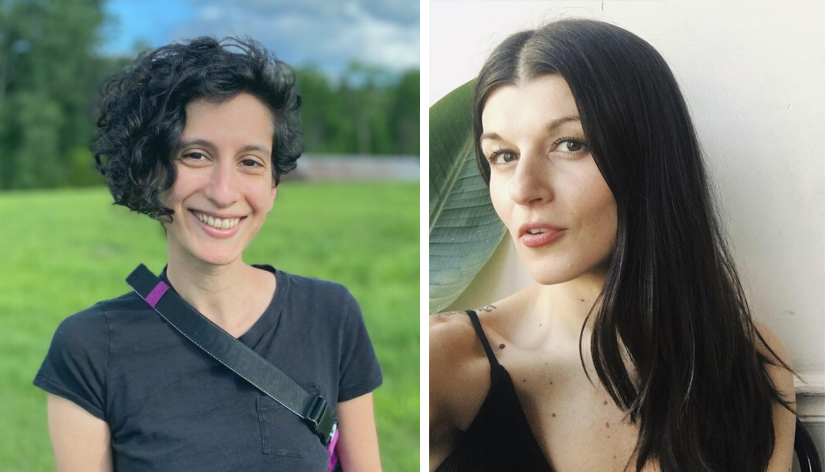Leading classes, and national conversations, on care and the therapeutic arts
 Assistant Professors of English and Communications Caren Beilin, left, and Victoria
Papa, right.
Assistant Professors of English and Communications Caren Beilin, left, and Victoria
Papa, right.
MCLA faculty members are working to bring topics around care to museum-goers at the same time they’re leading classes on care and the therapeutic arts, helping students develop empathy and critical thinking. In fact, they’re being recognized nationally for their work, which offers a wide array of justice-oriented education and community resources.
Victoria Papa and Caren Beilin, both assistant professors of English and communications, overlap in areas of expertise—Papa studies the intersections between care, creative expression, and the survival of structural forms of trauma, while Beilin’s recent book “Blackfishing the IUD” explores reproductive health and the IUD, gendered illness, medical gaslighting, and activism in the chronic illness community.
Papa co-directs CARE SYLLABUS, a program in partnership with MASS MoCA, which presents modules guest-curated by interdisciplinary artists and scholars who highlight artistic expression, activism, and thinking around the history of care and the way our societal attitudes around care are shifting. Beilin sits on its advisory collective, along with several other MCLA professors and museum professionals. CARE SYLLABUS has developed themed modules and in-person and virtual events since fall 2020, covering everything from the displacement of indigenous objects from their peoples to disability justice. Its next module, curated by Rizvana Bradley of UC Berkeley, will be released in November 2021.
The arts and culture world is taking note: A special themed issue of Art in America, a prestigious national magazine, mentioned CARE SYLLABUS in an overview of the history of therapeutic arts and included a feature on Beilin’s work. The CARE SYLLABUS team has received invitations to speak about the project at the National Gallery of Art in Washington, D.C., the California School of the Arts, and the Isabella Stewart Gardner Museum in Boston, among others.
“Several museum organizations are interested in this model of collaboration between a museum and institution of higher ed,” said Papa. “I think it really positions us well to center that expertise in our curriculum and through other kinds of programming and initiatives at MCLA. There are exciting possibilities for interdisciplinary work.”
In the classroom, courses like Narrative Medicine and Creativity and Survival task students with analyzing their experiences with the American health care system, or learning how creativity can be a way to deal with personal and social trauma.
“Many of our students identify as being anxious, depressed, or in other ways chronically ill,” said Beilin. “Our students are already experts in the American medical industrial complex in the sense that patients (or in some cases workers in this system) become experts in these things. Like anybody living in this country, our students have personal engagement with a really complicated thing—and many of their experiences highlight the for-profit nature of this system. Narrative Medicine, a creative writing course I offer, gives space for that witnessing, storytelling, agency, and even information sharing.”
The act of analyzing care and medicine during a pandemic brings new questions to light. “Care work applies to the structures and systems within society,” said Papa. “Through the continued work of CARE SYLLABUS, we’re reflecting on institutional structures—both their potentials and limitations. What does the relationship to care look like for academia and museums? How do we care within the frameworks allotted to us as educators? What are connections between care, student life, and social justice? We’re questioning what it means to be doing this work within our respective positions and institutions.”
Beilin and Papa also know their students—and the wider world—are interested in reflecting on these themes. “Especially for people who go into medical professions, there’s such an interest in having a holistic education, a humanistic approach to care,” said Beilin. “And this generation of students will question, and change, everything. It only makes sense for us to be providing more tools for a humanist and critical approach to these systems.”
Learn about CARE SYLLABUS at https://www.caresyllabus.org.
